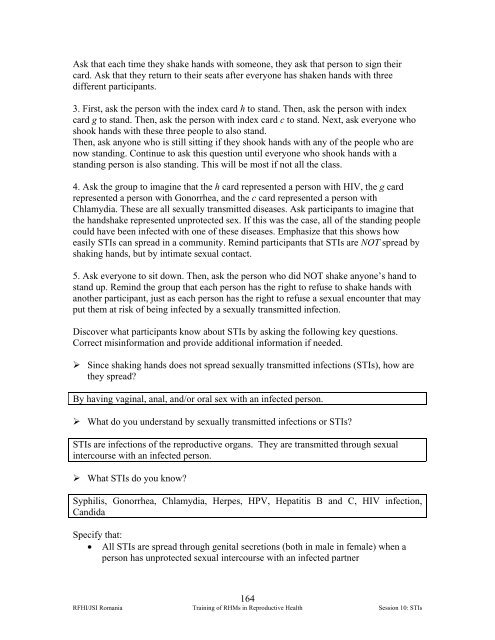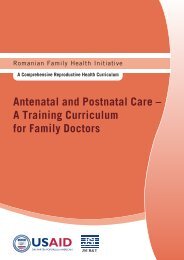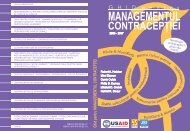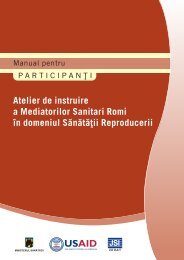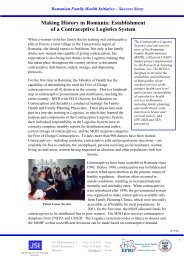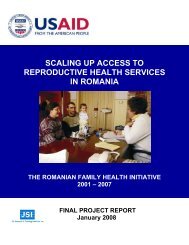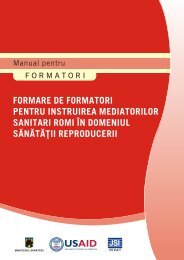Training of Roma Health Mediators in Reproductive Health
Training of Roma Health Mediators in Reproductive Health
Training of Roma Health Mediators in Reproductive Health
Create successful ePaper yourself
Turn your PDF publications into a flip-book with our unique Google optimized e-Paper software.
Ask that each time they shake hands with someone, they ask that person to sign their<br />
card. Ask that they return to their seats after everyone has shaken hands with three<br />
different participants.<br />
3. First, ask the person with the <strong>in</strong>dex card h to stand. Then, ask the person with <strong>in</strong>dex<br />
card g to stand. Then, ask the person with <strong>in</strong>dex card c to stand. Next, ask everyone who<br />
shook hands with these three people to also stand.<br />
Then, ask anyone who is still sitt<strong>in</strong>g if they shook hands with any <strong>of</strong> the people who are<br />
now stand<strong>in</strong>g. Cont<strong>in</strong>ue to ask this question until everyone who shook hands with a<br />
stand<strong>in</strong>g person is also stand<strong>in</strong>g. This will be most if not all the class.<br />
4. Ask the group to imag<strong>in</strong>e that the h card represented a person with HIV, the g card<br />
represented a person with Gonorrhea, and the c card represented a person with<br />
Chlamydia. These are all sexually transmitted diseases. Ask participants to imag<strong>in</strong>e that<br />
the handshake represented unprotected sex. If this was the case, all <strong>of</strong> the stand<strong>in</strong>g people<br />
could have been <strong>in</strong>fected with one <strong>of</strong> these diseases. Emphasize that this shows how<br />
easily STIs can spread <strong>in</strong> a community. Rem<strong>in</strong>d participants that STIs are NOT spread by<br />
shak<strong>in</strong>g hands, but by <strong>in</strong>timate sexual contact.<br />
5. Ask everyone to sit down. Then, ask the person who did NOT shake anyone’s hand to<br />
stand up. Rem<strong>in</strong>d the group that each person has the right to refuse to shake hands with<br />
another participant, just as each person has the right to refuse a sexual encounter that may<br />
put them at risk <strong>of</strong> be<strong>in</strong>g <strong>in</strong>fected by a sexually transmitted <strong>in</strong>fection.<br />
Discover what participants know about STIs by ask<strong>in</strong>g the follow<strong>in</strong>g key questions.<br />
Correct mis<strong>in</strong>formation and provide additional <strong>in</strong>formation if needed.<br />
‣ S<strong>in</strong>ce shak<strong>in</strong>g hands does not spread sexually transmitted <strong>in</strong>fections (STIs), how are<br />
they spread?<br />
By hav<strong>in</strong>g vag<strong>in</strong>al, anal, and/or oral sex with an <strong>in</strong>fected person.<br />
‣ What do you understand by sexually transmitted <strong>in</strong>fections or STIs?<br />
STIs are <strong>in</strong>fections <strong>of</strong> the reproductive organs. They are transmitted through sexual<br />
<strong>in</strong>tercourse with an <strong>in</strong>fected person.<br />
‣ What STIs do you know?<br />
Syphilis, Gonorrhea, Chlamydia, Herpes, HPV, Hepatitis B and C, HIV <strong>in</strong>fection,<br />
Candida<br />
Specify that:<br />
• All STIs are spread through genital secretions (both <strong>in</strong> male <strong>in</strong> female) when a<br />
person has unprotected sexual <strong>in</strong>tercourse with an <strong>in</strong>fected partner<br />
164<br />
RFHI/JSI <strong>Roma</strong>nia <strong>Tra<strong>in</strong><strong>in</strong>g</strong> <strong>of</strong> RHMs <strong>in</strong> <strong>Reproductive</strong> <strong>Health</strong> Session 10: STIs


